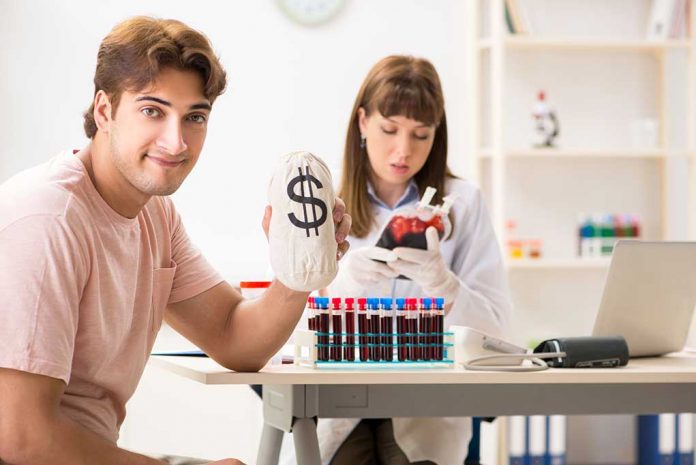
5 Bodily Fluids You Can Sell for CASH
(AscendHealthy.com) – Our bodies can be worth a lot of cash if we know where to look. Those of us with saleable goods might not be aware of how valuable they are, but there’s a big market for bodily fluids. Some limitations apply, and not everyone makes the perfect candidate, but healthy individuals looking for some extra funds have a few tempting options. Check out how easy it could be to get paid for fluids our bodies won’t even miss.
1. Blood Plasma
Hospitals always have a demand for plasma, which isn’t always readily available everywhere it’s needed. The clear, golden liquid remains after red blood cells, white blood cells, platelets, and a few other types of cells are filtered out; plasma is necessary for a host of life-saving therapies.
Plasma donation takes longer than whole-blood donations — up to 3 hours instead of 30 minutes — and can occur up to twice each week as opposed to once every 2 months. Because facilities value the commitment this type of donation requires, many are willing to pay a small amount of money for each visit. Blood plasma payments average $50, but the rate varies according to the institution, so check out local resources for more info.
2. Semen
This option won’t work for everyone, but healthy men who have no problem parting with their sperm can make enough selling it to supplement nearly any income comfortably. For example, California Cryobank pays qualified donors $1,500 per month for samples; donors spend an average of 5 hours each month at the facility for said compensation. That’s about $300 an hour for engaging in an activity most guys do regularly anyway.
The biggest drawback to selling semen is the prospect of having at least one child out there who will likely always be a stranger. Not everyone can live with the idea of having no say in their offspring’s upbringing, and strong religious beliefs, political values or social ideals may dissuade many eligible men. Donors may also want to consider current and future partners’ knowledge and feelings.
3. Breast Milk
Not all new moms can produce the milk their babies need, and newborns in critical care all across the country need every benefit they can get. When approached properly, a diet of 100% human breast milk may improve critically ill infants’ outcomes. That’s where nursing mothers with an excess of milk come into play. Online communities like Only the Breast help healthy women sell their milk for up to $1 per ounce. Some for-profit milk banks also compensate donors.
4. Eggs
Far too many couples struggle with infertility and other barriers that make conceiving on their own impossible. Healthy eggs from donors can help some people overcome those barriers — and they’re willing to pay good money to do it. First-time donations can earn a woman about $6,500. This rate increases for future donations.
Similar to sperm donations, giving up one’s eggs isn’t a decision to take lightly. Prospective donors should understand the potential emotional repercussions before signing up.
The procedure also requires a commitment to taking fertility hormones, which may cause side effects like headaches, mood swings, abdominal bloating and even weight gain. In addition, women must undergo surgical retrieval of eggs, which is performed vaginally while under sedation.
5. Stool
This might seem a bit gross to consider, but it’s also vital to saving countless lives. Each year, Clostridium difficile (also known as C. diff), an intestinal microbe often resistant to most antibiotics, kills about 30,000 US residents. This microbe usually takes over when a person’s gut is severely out of balance, and in extreme cases, a fecal transplant is the only life-saving option.
It might seem easy to just sell our poop, but the process is known to be very selective, with only about 3% of willing participants actually making the cut. But healthy volunteers with strong microbiomes can earn an average of $250 each month just by leaving weekly deposits. Another limitation is that participants must live close enough to donation facilities to give fresh samples in the clinics themselves.
Meeting the Qualifications
Selling bodily fluids may sound like an easy way to make some quick cash, but this isn’t always the case. All of the above programs require participants to pass physical exams and blood screenings before they can qualify. Having a personal or family medical history of certain conditions may prevent some individuals from participating. This may include cancer or something as simple as asthma, high blood pressure or being overweight.
People who have engaged in risky behaviors that put them at risk for HIV and certain other infections cannot apply. Some facilities may also place age limits and other restrictions on their donors. For example, they may reject an applicant for being a smoker or for needing certain prescription medications.
There are a lot of ways we can supplement our incomes with our bodies alone. As long as we meet a few basic requirements, we can help ourselves and improve others’ lives. We may have what others desperately need, so why not share the extra while we can?
~Here’s to Your Healthy Ascension
Copyright 2024, AscendHealthy.com




















